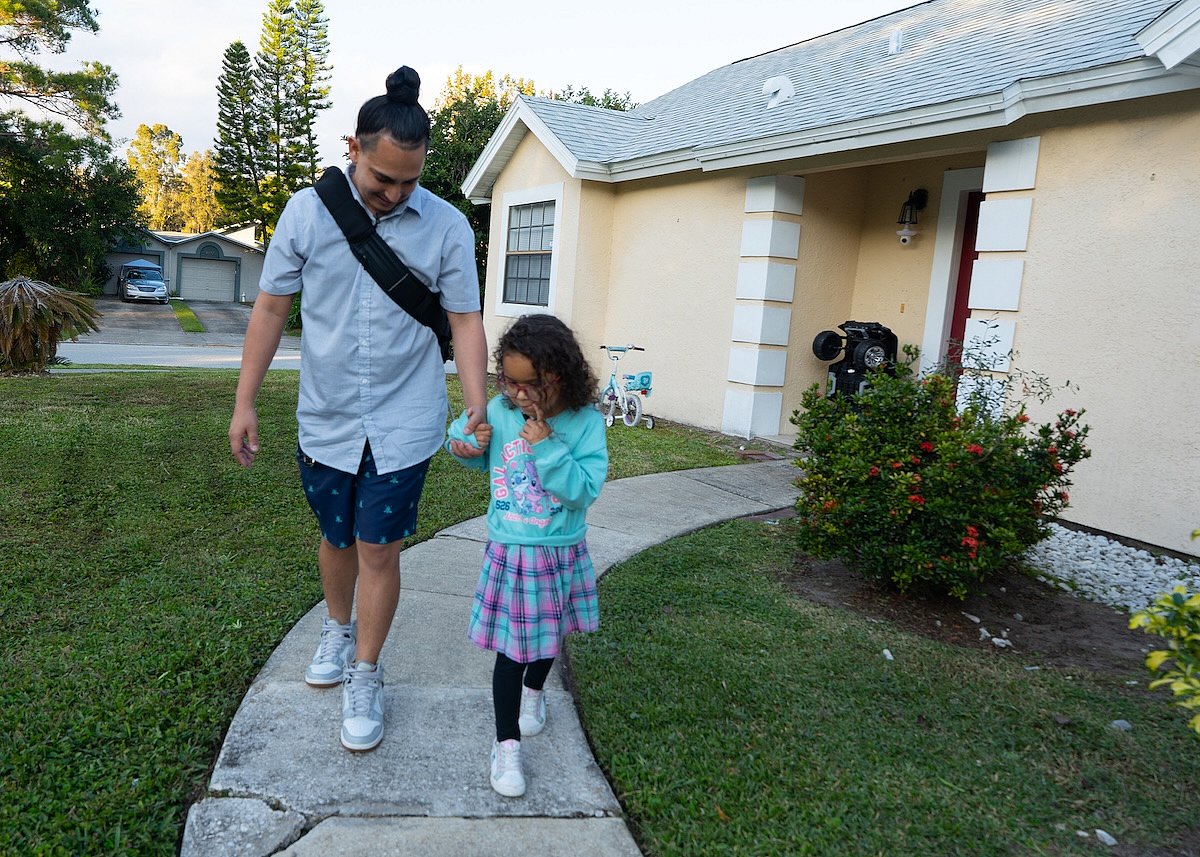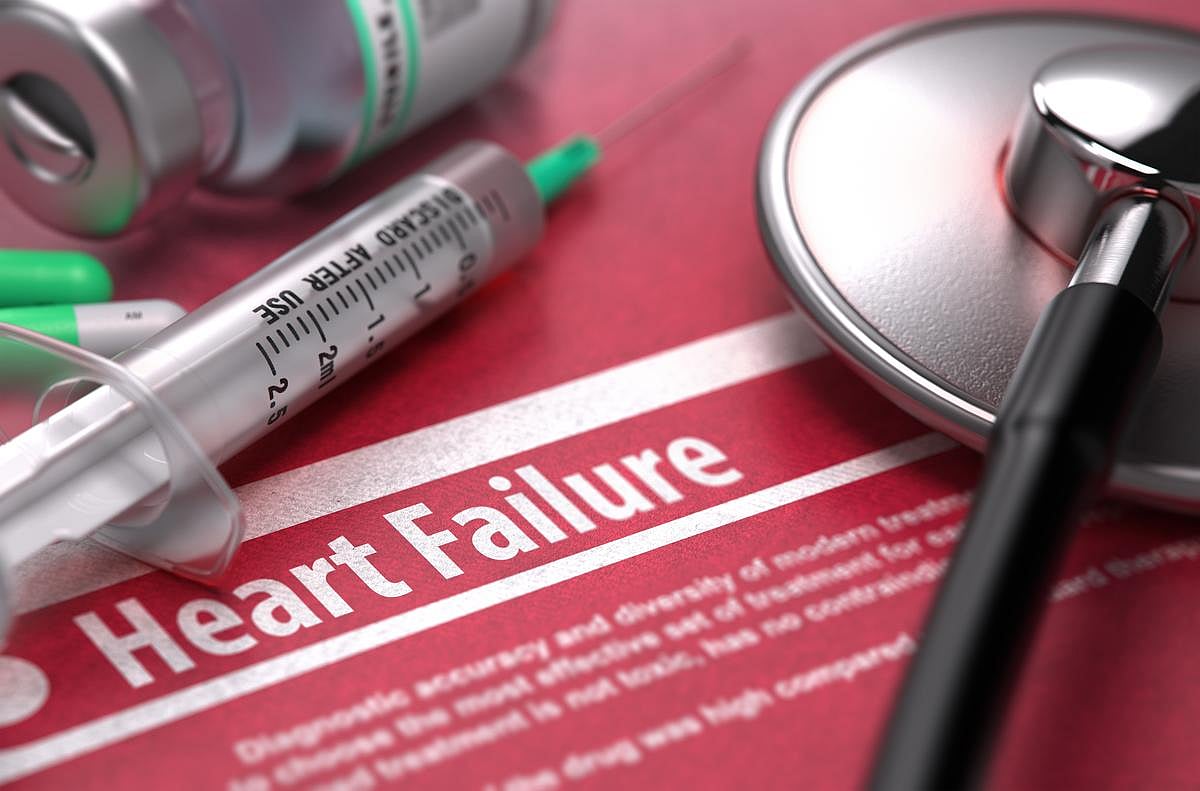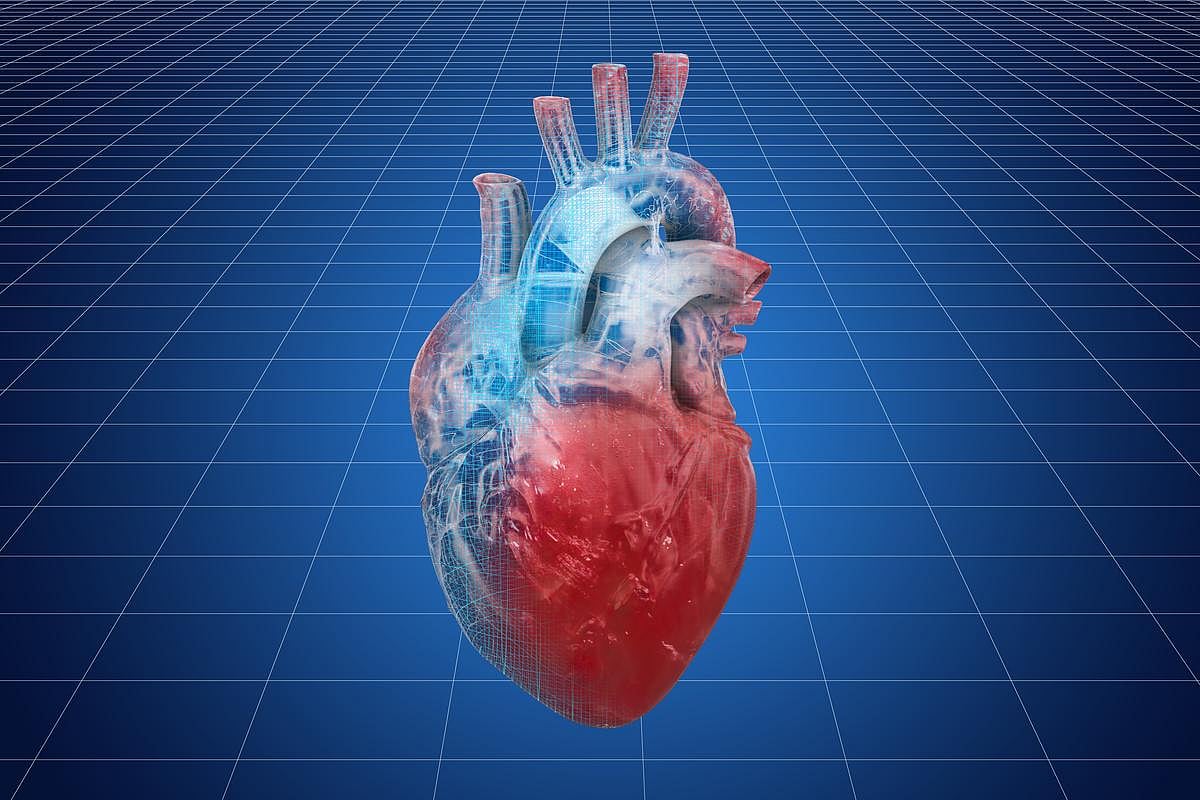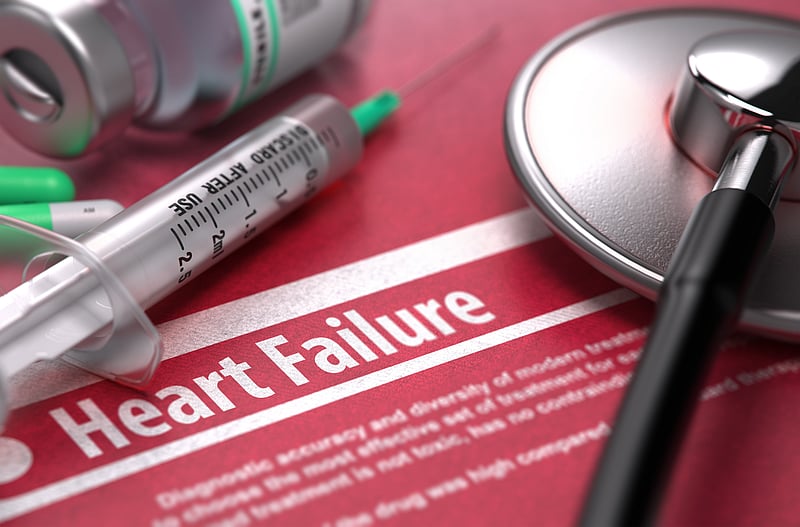Get Healthy!
Results for search "Heart Failure".
08 Dec
Two New Studies Find Strong Link Between Epilepsy and Depression
Depression not only makes epilepsy harder to treat but may also raise the risk of developing it, new research finds.
20 Nov
No Safe Level: Light Smoking Tied to Serious Heart Damage
A new study finds just a couple of cigarettes per day increase the risk of heart failure and death.
04 Nov
Long-Term Melatonin Use Linked to Higher Heart Failure Risk
People with insomnia who take melatonin for at least a year face a higher risk of heart failure over time, according to the preliminary results of a large new study.
Health News Results - 116
Alex Balmes’ symptoms were uncommon for a 32-year-old — irregular heartbeat, fatigue, shortness of breath, bloating, unexpected weight gain.
In fact, these are all classic symptoms of heart failure, but Balmes didn’t give that possibility a...
- Dennis Thompson HealthDay Reporter
- |
- February 3, 2026
- |
- Full Page
People on the verge of type 2 diabetes can cut their risk of death from heart disease by more than 50% if they bring their blood sugar levels back to normal, a new study says.
Patients with prediabetes...
- Dennis Thompson HealthDay Reporter
- |
- December 22, 2025
- |
- Full Page
Usually, it’s not until late middle age that folks start worrying about heart disease.
But a first-of-its-kind online calculator is now available to help adults as young as 30 forecast their risk of heart problems decades out, researchers reported Nov. 17 in the Journal of the American College of Cardiology....
- Dennis Thompson HealthDay Reporter
- |
- November 18, 2025
- |
- Full Page
Folks using melatonin supplements as a sleep aid might be putting themselves at risk for future heart problems, a new study says.
Adults with insomnia who’d been using melatonin for a year or more had 90% higher odds of heart failure, researchers are scheduled to report Nov. 10 in New Orleans at a meeting of the American Heart Assoc...
- Dennis Thompson HealthDay Reporter
- |
- November 3, 2025
- |
- Full Page
Nearly everyone who suffers a heart attack, stroke or heart failure had at least one warning sign that cropped up years before, a new study says.
More than 99% of patients had one or more risk factors prior to their heart emergency, including high blood pressure, elevated ch...
- Dennis Thompson HealthDay Reporter
- |
- September 30, 2025
- |
- Full Page
Disparities in education and access to insurance mean that heart failure hits Black American adults nearly 14 years earlier than it does white Americans, new research shows.
Among Black patients, heart failure typically sets in at about 60 years of age, compared to 73.6 on average...
- Ernie Mundell HealthDay Reporter
- |
- September 2, 2025
- |
- Full Page
Pro wrestling icon Hulk Hogan died of a heart attack, Florida officials confirmed Thursday.
The 71-year-old entertainer, whose real name was Terry Gene Bollea, died last week in Clearwater, Florida.
The official cause of death was acute myocardial infarction, the medical term for a heart attack, according to records from the medical examiner obtained by NBC News.
<...- HealthDay Reporter
- I. Edwards
- |
- August 1, 2025
- |
- Full Page
Wildfire smoke might increase a person’s risk of developing heart failure, a new study suggests.
People had a 1.4% higher risk of heart failure for every 1 microgram per cubic meter increase in their exposure to particle pollution from wildfires, researchers report in the
- HealthDay Reporter
- Dennis Thompson
- |
- July 3, 2025
- |
- Full Page
The health of women who experience severe bleeding after giving birth can remain in peril for up to 15 years afterward, a major new evidence review says.
Women who survive postpartum hemorrhage are 76% more likely to suffer health problems like heart failure, stroke and heart disease for more than a decade afterward, researchers report in the
Two out of 5 people with heart failure are more likely to die because they aren’t regularly seeing a cardiologist, a new study says.
The 3 in 5 heart failure patients who do see a cardiologist once a year have a 24% lower risk of death, researchers report in the European Heart...
- HealthDay Reporter
- Dennis Thompson
- |
- May 20, 2025
- |
- Full Page
“Broken heart syndrome” sounds like a romantic, fairy-tale notion -- the idea that suffering a devastating loss that can cause one’s heart to wither.
But this syndrome, formally known as Takotsubo cardiomyopathy, continues to be associated with a high rate of death and illness, researchers reported May 14 in the
An older person’s hearing might be a harbinger of heart health, a new study says.
People who experience hearing loss are more likely to develop he...
- HealthDay Reporter
- Dennis Thompson
- |
- April 10, 2025
- |
- Full Page
More people die from heart problems during heatwaves where high temperatures stretch through both the day and night, a new study says.
Heatwaves that offer no relief at night -- known as compound heatwaves -- are much more deadly than soaring daytime temperatures alone, researchers reported April 1 in the Journal of the American Colle...
- HealthDay Reporter
- Dennis Thompson
- |
- April 7, 2025
- |
- Full Page
Folks frequently use their smartwatches to monitor their daily step count, aiming to get enough physical activity to improve their health.
But smartwatches are tracking another measure of health that could prove even more important, a new study suggests.
Smartwatches ...
- HealthDay Reporter
- Dennis Thompson
- |
- March 24, 2025
- |
- Full Page
Cardiovascular disease is a general term that refers to many different types of heart problems.
Heart disease is the No. 1 cause of death in the United States. In fact, one American dies from heart disease every 33 seconds, according to the U.S. Centers for Disease Control and Prevention (CDC).
Thes...
- HealthDay Reporter
- Denise Maher
- |
- March 8, 2025
- |
- Full Page
Landing in the hospital with COVID or the flu can put your heart health at dire risk, a new study suggests.
Adults hospitalized for a severe infection are more than twice as likely to develop heart failure years later, according to findings published Jan. 30 in the
Failing hearts nearly returned to full function in laboratory pigs after they received an experimental gene therapy.
New research shows the gene therapy didn’t just prevent heart failure from worsening in four lab pigs, but actually prompted hearts to repair and grow stronger.
...- HealthDay Reporter
- Dennis Thompson
- |
- December 10, 2024
- |
- Full Page
Bed sores can be more than debilitating and painful. Now a new study shows they can also dramatically impact a person’s recovery from a spinal cord injury.
“Our study found that patients with pressure ulcers [bed sores] regained significantly less motor function through one year after injury,” said researcher
For the 4 in 10 patients with newly diagnosed heart failure who also have the heart rhythm disorder atrial fibrillation, the prognosis can be poor.
"Atrial fibrillation can make heart failure much more problematic, and more complex to treat," said researcher
Beta blockers are go-to meds for many people who've survived a heart attack.
However, new Swedish research has found that they might not be needed for heart attack survivors whose hearts have retained a normal pumping ability.
Using them in this group ...
- HealthDay Reporter
- Ernie Mundell
- |
- November 12, 2024
- |
- Full Page
Women have a higher risk of heart failure and stroke than men while undergoing dialysis for kidney failure, a new study shows.
However, women also have a lower overall risk of dying than men, researchers found.
The bottom line: “Women have to be treated differently when it c...
- HealthDay Reporter
- |
- November 8, 2024
- |
- Full Page
An AI-enhanced digital stethoscope can help doctors detect a potentially deadly form of heart failure that can occur late in pregnancy, a new clinical trial reports.
The AI-driven stethoscope was 12 times more likely than traditional methods to spot heart pump weakness tied to peripartum cardiomyopathy, an uncommon form of
Research has already proven that the blockbuster weight-loss drug Wegovy (semaglutide) can slash a person's odds for heart attacks and strokes, and now more data from the same trial suggests that's even true for very ill patients with heart failure.
The finding also helps clear up a con...
- HealthDay Reporter
- Ernie Mundell
- |
- August 23, 2024
- |
- Full Page
The second person to receive a kidney from a genetically modified pig has died, surgeons at NYU Langone Health announced Tuesday.
The 54-year-old patient, Lisa Pisano, had both kidney failure and heart failure. She received the pig kidney April 12, eight days after she had a mechanical ...
- HealthDay Reporter
- Robin Foster
- |
- July 10, 2024
- |
- Full Page
Weight-loss drugs like Wegovy can improve symptoms in heart failure patients, a new clinical trial shows.
Both men and women showed improved heart function after a year on semaglutide, the active ingredient in Ozempic and Wegovy, researchers report.
...- HealthDay Reporter
- Dennis Thompson
- |
- June 25, 2024
- |
- Full Page
An experimental drug can help patients better live with a genetic condition that causes the heart to enlarge and thicken, a new clinical trial shows.
People with the condition, hypertrophic cardiomyopathy (HCM), were able to take in and use significantly more oxygen while exercising after taking the drug aficamten, researchers reported May 15 in the
People with heart failure are often prescribed what are known as loop diuretic medications to help reduce the fluid buildup that's a hallmark of the disease.
Now, research suggests that taking the blockbuster weight loss drug Wegovy (semaglutide) can help patients reduce their need for diuretics.
After a year taking Wegovy, "there...
- HealthDay Reporter
- Ernie Mundell
- |
- May 13, 2024
- |
- Full Page
Yoga can help improve the long-term health of people with heart failure, a new study has found.
"Patients who practiced yoga on top of taking their medications felt better, were able to do more, and had stronger hearts than those who only took drugs for their heart f...
- HealthDay Reporter
- Dennis Thompson
- |
- May 13, 2024
- |
- Full Page
New Jersey native Lisa Pisano was staring down the end of her days.
The 54-year-old had heart failure and end-stage kidney disease, but several chronic medical conditions excluded her as a candidate for heart and kidney transplants.
"All I want is the opportunity to have a better ...
- HealthDay Reporter
- Dennis Thompson
- |
- April 24, 2024
- |
- Full Page
The dangerous heart rhythm disorder known as atrial fibrillation is mainly known for increasing people's risk of stroke.
But people with A-Fib actually have a much higher risk of developing heart failure than suffering a stroke, a new study shows.
In fac...
- HealthDay Reporter
- Dennis Thompson
- |
- April 19, 2024
- |
- Full Page
For people struggling with both diabetes and a common type of heart failure, the weight-loss drug Wegovy may do more for their health than help them shed pounds, new research suggests.
In the study, published Saturday in the New England Journal of Medicine, researchers reported that the drug helped people with typ...
- HealthDay Reporter
- Robin Foster
- |
- April 9, 2024
- |
- Full Page
Think vaping is the "healthy" alternative to smoking?
Think again: A new study finds it raises people's odds for heart failure.
"More and more studies are linking e-cigarettes to harmful effects and finding that it might not be as safe as previously thought,"said study lead author
Babies born to mothers who experience profound grief during pregnancy may be vulnerable to heart failure much later in life, new research suggests.
"If future studies support our findings, the implementation of early screening for risk factors such as obesity, hypertension and diabetes in children born to mothers who experienced bereavement, as well as the adoption of preventive measures,...
- HealthDay Reporter
- Lori Saxena
- |
- February 28, 2024
- |
- Full Page
Living close to a pub, bar or fast-food restaurant doesn't do your heart any favors, a new study finds.
Folks who live in close proximity to such establishments have a higher risk of heart failure, compared to those who live farther away, researchers report in the Feb. 27 issue of the journal Circulation: Heart Failure.
These findings weren't a complete surprise, said...
- HealthDay Reporter
- Dennis Thompson
- |
- February 27, 2024
- |
- Full Page
Women might need a lot fewer daily steps to lower their risk of heart failure than they think, a new study suggests.
The usual recommendation is that people get 10,000 steps a day, but women ages 63 and older actually gain solid heart benefits from around 3,600 steps daily, researchers report Fev. 21 in the journal
Pulse oximeters, devices that measure your blood's oxygen levels, are known to work less accurately in Black patients.
Now, new research suggests faulty readings might also be worsening the care of Black people who battle heart failure.
The findings could signal a needed shift in heart failure care, said senior study author
Heart disease remains the United States' top cause of death, but progress is being made and more lives are being saved, a new report finds.
There were 931,578 heart-related deaths in 2021, an increase of less than 3,000 from the year before, the report from the American Heart Association (AHA) showed.
But overall, death rates from heart disease have declined 60% since the 1950s, AHA...
- HealthDay Reporter
- Dennis Thompson
- |
- January 24, 2024
- |
- Full Page
Flu and COVID are sweeping across the country, posing a particular hazard to people at risk for heart disease.
These respiratory infections can trigger heart complications from fever, dehydration and inflammation, experts from Mount Sinai Fuster Heart Hospital say.
Mount Sinai doctors are seeing an increase in heart problems prompted by respiratory infections, and it's happening acr...
- HealthDay Reporter
- Dennis Thompson
- |
- January 23, 2024
- |
- Full Page
Depression affects half of the 6 million Americans who struggle with debilitating heart failure.
Now, research shows that two leading modes of treatment -- antidepressants and an approach called behavioral activation psychotherapy -- work equally well to ease depression among these patients.
Behavioral activation psychotherapy works by promoting involvement in activities that the pa...
- HealthDay Reporter
- Ernie Mundell
- |
- January 22, 2024
- |
- Full Page
Childhood cancer survivors are at increased risk of developing heart failure later in life, due to the chemotherapy that was used to save their lives.
But an already approved drug might help reduce that risk, according to a new report published Jan. 9 in The Lancet Oncology journal
- HealthDay Reporter
- |
- January 12, 2024
- |
- Full Page
Heart failure is a major killer.
However, a new study finds that heart failure patients living in poorer neighborhoods are much less likely to pick up lifesaving meds from local pharmacies, compared to patients living in more affluent locales.
The reasons behind the disparity aren't clear, said senior study author Samrachana ...
- HealthDay Reporter
- Ernie Mundell
- |
- December 18, 2023
- |
- Full Page
Patients with advanced heart failure can benefit from stem cell therapy, a large, new clinical trial has found.
Injections of stem cells programmed to heal damaged heart tissue wound up improving overall quality of life for heart failure patients, compared to those who received a placebo treatment.
"Data from one of the largest cardiovascular cell therapy trials, testing a regenerat...
- HealthDay Reporter
- Dennis Thompson
- |
- December 15, 2023
- |
- Full Page
People who regularly smoke medical marijuana may be increasing their risk for a heart attack, heart failure or stroke, new research suggests.
One study found that cannabis use among older patients increases the risk of heart attack or stroke by 20%. The second study found that using cannabis increased the risk of heart failure by 34%.
The studies are scheduled for presentation at an...
- HealthDay Reporter
- Steven Reinberg
- |
- November 6, 2023
- |
- Full Page
Heart failure can make everyday activities and exercise tough to carry out, but yoga might be a beneficial add-on to standard care.
A new study from India finds this ancient practice improves quality of life and cardio functioning.
"Our patients observed improvement in systolic blood pressure and heart rate compared to patients who were on medication without yoga,"said lead stu...
- HealthDay Reporter
- Cara Murez
- |
- September 26, 2023
- |
- Full Page
Weight-loss drug Wegovy (semaglutide) and its diabetes-focused cousin, Ozempic, have already upended the treatment of both obesity and diabetes, with sales of both drugs skyrocketing.
Now, injected Wegovy could prove a boon for many patients battling heart failure, a new study suggests. The trial results were presented Friday in Amsterdam at the annual meeting of the European Society of C...
- HealthDay Reporter
- Ernie Mundell
- |
- August 25, 2023
- |
- Full Page
Wearable devices like smartwatches continually track physical activity, urging folks to take more daily steps for their health.
Now, a new study suggests this gentle technological nagging could be of great benefit to people whose hearts are giving out.
Heart failure patients who get between 1,000 and 5,000 steps a day have significantly improved symptoms and fewer physical limitatio...
- HealthDay Reporter
- Dennis Thompson
- |
- July 26, 2023
- |
- Full Page
In areas where Black Americans have been historically affected by discriminatory housing practices, there is higher heart failure risk, according to new research.
Researchers studying more than 2.3 million U.S. adults between 2014 and 2019 found that heart failure today was linked to "redlining," which began in the 1930s. Heart failure risk for Black people who lived in these redlined ZIP...
- HealthDay Reporter
- Cara Murez
- |
- July 18, 2023
- |
- Full Page
Call it a hand signal of sorts.
New research from Germany shows that the common nerve disorder carpal tunnel syndrome (CTS), may be a harbinger for heart failure among older folks.
In a study of 164,000 people, those 60 years or older who had the condition, which causes pain, weakness and numbness in the hand and wrist, had nearly a 50% higher risk for heart failure.
But the a...
- HealthDay Reporter
- Alan Mozes
- |
- July 13, 2023
- |
- Full Page
Patients who develop a devastating heart condition have new reason to hope after a study identified three men whose condition spontaneously reversed.
The condition is called transthyretin cardiac amyloidosis. It involves a buildup of sticky, toxic proteins that can lead to heart failure. About half of patients die from the progressive disease within four years of diagnosis.
Until no...
- HealthDay Reporter
- Cara Murez
- |
- June 8, 2023
- |
- Full Page














































